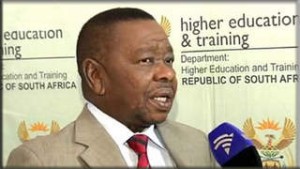
This comes as a report “is on its way to my desk”, according to the minister, regarding possible changes to the National Student Financial Aid Scheme (NSFAS), which cuts off financial support above an annual R120 000 household income. The report arises from recommendations tabled in the cabinet in January after a years-long review committee started by Nzimande’s predecessor.
“We have asked NSFAS how we can support those students who come from families which do not qualify, but who are not rich. The report is on the way. It’s done.
“It’s on the way to my desk. We will look into it and what possibilities the report raises,” said Nzimande on Monday.
The NSFAS means-test effectively leaves stranded many students from the working class and lower and aspirant middle classes whose parents earn too much but not enough to carry the burden of university education, costed by some at R100 000 a year.
However, the minister on Monday also stressed the need for a study of cost-drivers at universities, many of which hiked their fees well above inflation, while a further step would also be a look at regulating fee increases. This could take the form of ministerial concurrence if fees were to go beyond the inflation rate.
Business also had to come to the table.
Nzimande dismissed the notion that the current student protests was a national crisis: “Yes, it is a challenge, but I would not call it a crisis because we have ways to discuss the matter.”
Tuesday’s meeting, which also includes student representatives, is set to come up with a common framework to fee increases for next year.
Urging institutions to negotiate, and students to allow the negotiations to run their course, Nzimande said he was very sympathetic to the students, but his office wasn’t the first port of call because universities were autonomous.
Coming out in support of the student protests on Monday, labour federation Cosatu dismissed the government’s argument that universities were autonomous institutions.
“Cosatu believes education should be treated as a societal issue, largely located in the hands of the government. The whole concept of institutional autonomy of universities does not work because it disconnects these institutions from the reality of our society,” said Cosatu.
ANC national spokesman Zizi Kodwa said “unreasonable” tuition fee increases were effectively “reversing the gains, generally, we made to open up access to higher education, particularly for poor and black students”, many of whom would not be at university otherwise. However, increased access to higher education had brought about new challenges, which had to be resolved.
A regulatory framework on fee increments was needed and, as the recent ANC national general council mid-term review decided, so was a relook at the NSFAS funding model.
“If we don’t engage universities, these will again become lily-white institutions,” said Kodwa. “Education is a right and we must commend students for having stood up in defence of the right to learn.”
The NSFAS budget for poor academically capable students stood at R9.5 billion this year, up from R441 million in 1997. That allocation is part of the around R30bn funding the government allocates to higher education. It represents 0.72 percent of South Africa’s gross domestic product. Following the NSFAS allocation, the remaining R21bn is split among universities according to their baseline requirements. This year, Wits got R1.148bn, UCT R1.074bn and Stellenbosch University R1.177bn, according to higher education deputy director-general responsible for universities Dianne Parker
While NSFAS has funded 1.5 million students, the scheme has also been bedevilled by mismanagement and fraud allegations. These are now subject to a forensic audit.
Students at Stellenbosch University and the universities of Johannesburg and Pretoria are expected to join colleagues at Wits, UCT and Rhodes University, where classes were suspended.
Meanwhile, a meeting between Fort Hare University and the student representative council was scheduled for Tuesday to discuss and “resolve” student demands, according to a letter from the registrar Professor Mike Sommiso. Students demanded that fees should not increase and called for the reversal of the ban on those owing money from writing the upcoming exams.
UCT met on Monday night to discuss the protests over fees.
Two university chancellors – Adam Habib from Wits and Dr Sizwe Mabizela from Rhodes – pledged to donate part of their income to financially disadvantaged students.
IOL
